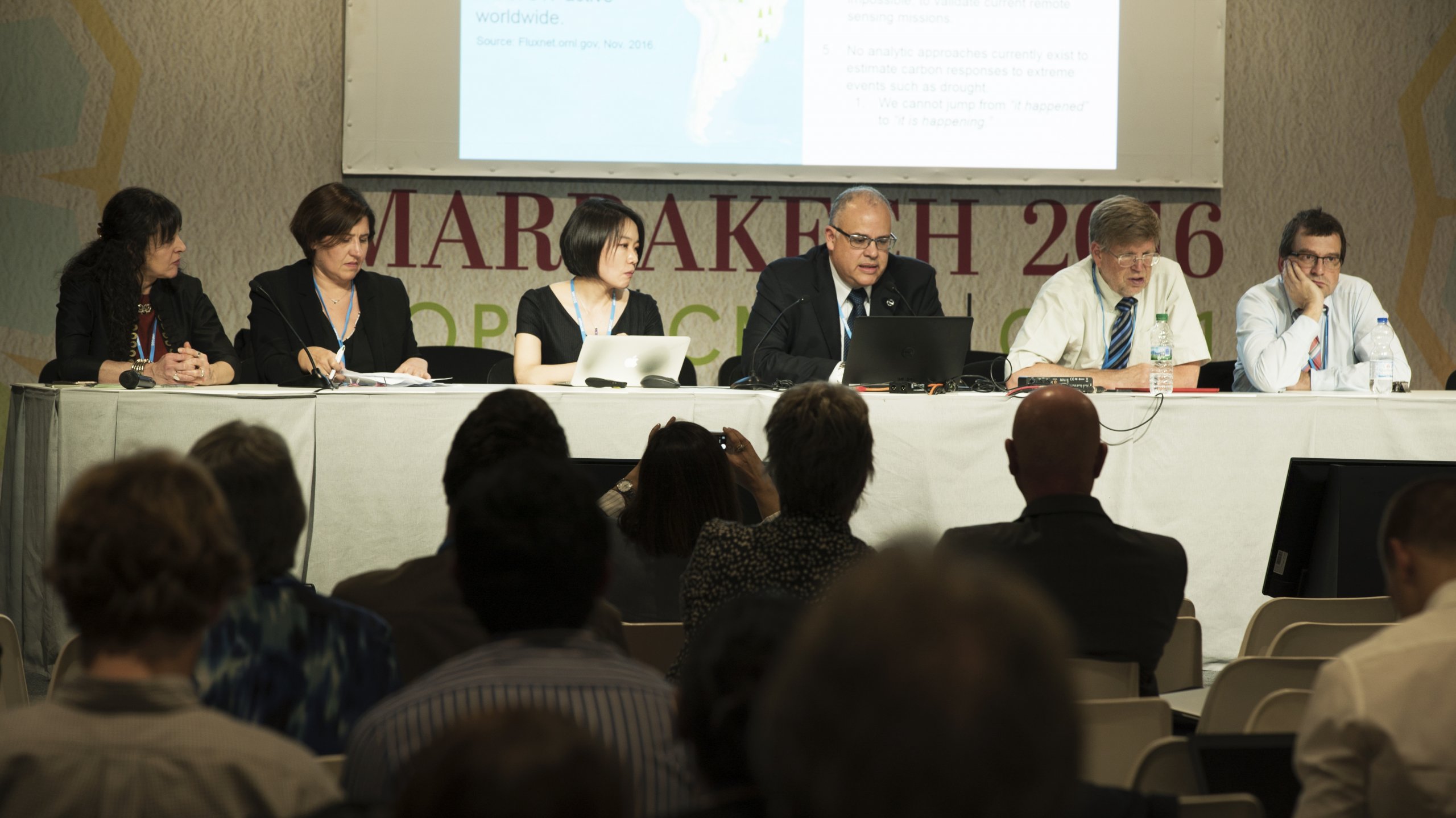On the opening day of COP22, the International Council for Science in partnership with the Scientific Committee on Antarctic Research (SCAR), the Inter-American Institute for Global Change Research (IAI), the World Climate Research Programme (WCRP), and the Intergovernmental Panel on Climate Change (IPCC) Working Group I convened a side event on key pressing issues in fundamental climate research following the Paris Agreement.

The event brought together a group of high level scientists, representatives of research agencies and research funding agencies. The event was moderated by Valérie Masson-Delmotte, co-chair of IPCC Working Group I, and David Carlson, Director of WCRP.
David Carlson opened the event by stating that the climate system does not listen to the Paris Agreement. He emphasized the importance of fundamental research in understanding climate signals in order to build credible adaptation and mitigation actions as well as in informing national, regional and international assessments.
Jochem Marotzke from the Max Planck Institute for Meteorology stated that the Paris Agreement has liberated climate research from discussing what we already know – the world is warming, and humans are largely responsible – and that now climate research must define its new frontiers and probe deeper into the unknown. He argued that basic climate research can sharpen its view through three simple yet powerful guiding questions:
He argued that these guiding questions not only help to shape the fundamental research agenda, they are at the heart of what society needs to know to prepare for the climate change challenges ahead.
Boram Lee from WCRP looked at these broad research questions from the perspectives of water and food security. Key questions for the research community to tackle include:
She also emphasized the need to bring human dimensions (including water management) into research, as well as a representation of land use effect in regional and global climate.
Irene Schloss from the Instituto Antártico Argentino provided an Antarctic perspective on these three questions. She also stressed the need to gain an understanding of climate variation at scales relevant to biological processes. Furthermore, she emphasized the importance of interdisciplinary thinking and working in translating climate data into answers about the fate of carbon and the habitability of the environment to maintain biodiversity in Antarctica.
Arturo Sanchez-Azofeifa from the University of Alberta stressed the need for a better understanding of the response of tropical ecosystems to climate change across all types of forest types, not just the Amazon. He also outlined some key fundamental scientific questions for Latin America, from a tropical ecosystems perspective:
Valérie Masson-Delmotte outlined key uncertainties and gaps from an IPCC perspective, which included: the gap in observations (with respect to dryness, ocean and atmospheric circulations), gaps on drivers of climate change, roles of aerosols and interactions with clouds, the role of carbon feedbacks, many aspects of the water cycle, many aspects of Antarctic climate (ice sheet dynamics, sea level rise, change in variability from day to day, for extremes). She also stated that as the IPCC is now going into the 6th assessment cycle, a number of scoping meetings are being held to prepare special reports.
Fatima Driouech from the National Climate Center of Morocco emphasized the need to better understand the impacts of extreme events and to enhance the robustness of forecasting such events at different scales to improve risk management. She also highlighted the need for higher quality observations, especially at the regional level, better assessment and better prediction of potential impacts of events, to allow efficient adaptation.
Wilfran Moufouma-Okia from the IPCC Working Group 1 Technical Support Unit stressed the need to have the right balance between climate science knowledge production and policy dialogue, in other words, the climate science agenda should not only be driven by governments but also by curiosity. In the African context, more research is needed on assessing the local to regional response of climate change, how the weather will react to a changing climate and what risks and impacts are associated.
Erica Key from the Belmont Forum explained how the Forum operates and emphasized that its key focus is to advance inter- and trans-disciplinary science to address global challenges. She stated that the Forum contributed over 100 million EUR for climate relevant research and provided examples of current funding opportunities for the climate science community. The Forum also supports capacity building activities on how to do trans-disciplinary research. She stressed that the Forum works closely with the scientific community to define its funding priorities.
Speakers from the audience and the panel emphasized the need to ensure that funding does not only go to answer already known questions, but also to address questions that have not yet been asked. Speakers also emphasized the need for funding for long-term monitoring, which is currently done on a five-year cycle.
The session was live streamed and is available online.